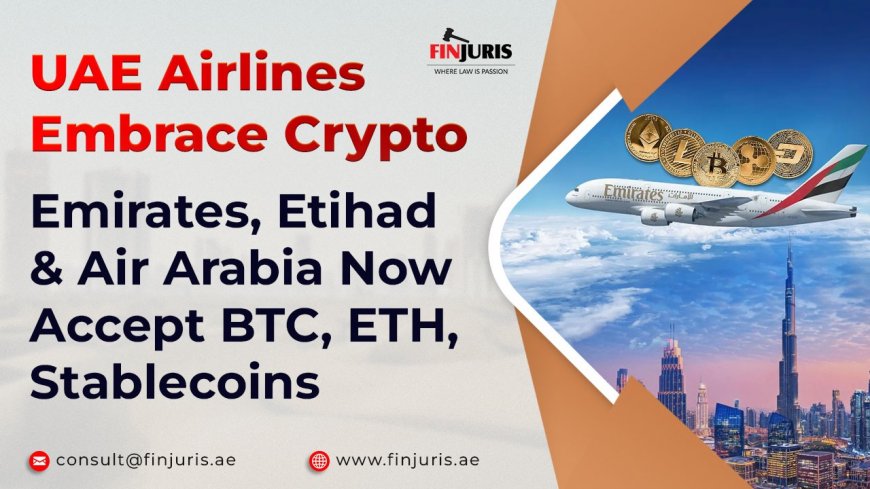UAE Airlines Embrace Crypto: Emirates, Etihad & Air Arabia Now Accept BTC, ETH, Stablecoins
UAE airlines Emirates, Etihad & Air Arabia now accept BTC, ETH & stablecoins, offering faster, flexible, and borderless travel payments.

The United Arab Emirates, long recognized as a global hub for innovation, finance, and luxury travel, has taken yet another pioneering step in its journey toward becoming the world’s most forward-thinking destination. Its flagship airlines- Emirates, Etihad Airways, and Air Arabia have announced that they are embracing cryptocurrencies as a means of payment, allowing customers to purchase tickets, upgrades, and a variety of travel services using Bitcoin (BTC), Ethereum (ETH), and regulated stablecoins.
Read More: Crypto License in Dubai: Everything You Need to Know in 2025
This development marks a significant departure from traditional payment systems in aviation, which have long relied on credit cards, bank transfers, and local currencies. By accepting digital assets, the UAE’s airlines are aligning themselves with the global trend of financial decentralization and innovation in blockchain technology. For passengers, this promises greater flexibility, faster transactions, and lower costs when booking and enjoying travel experiences. For the airlines, it represents an opportunity to connect with tech-savvy travellers, digital nomads, and the rapidly growing population of crypto investors who seek real-world applications for their holdings.
Read More: The Reason Crypto Millionaires are Relocating to the UAE
Emirates and the Crypto.com Partnership
Among the carriers, Emirates has taken the boldest step, signing a preliminary agreement with Crypto.com in mid-2025. This collaboration will allow Emirates to integrate Crypto.com Pay into its booking and service systems, opening the door for travelers to use more than thirty different cryptocurrencies for everything from booking long-haul flights to purchasing duty-free goods on board. The move is particularly noteworthy given Emirates’ global reputation as a luxury airline, famous for its first-class cabins, advanced in-flight entertainment, and customer service.
For Emirates, crypto integration is not just a payment upgrade; it is a reflection of its wider digital-first strategy. The airline has consistently sought to stay ahead of the curve, from deploying biometrics in airport check-ins to embracing artificial intelligence in customer service. By adding cryptocurrency to its offerings, it signals to international markets that Dubai and the UAE are committed to being at the forefront of the digital economy. The full rollout of the system is scheduled for 2026, giving Emirates time to refine infrastructure, compliance processes, and consumer education around the use of digital currencies in aviation.
Read More: How to Buy and Sell Cryptocurrency in UAE
Air Arabia’s Stablecoin Innovation
While Emirates has gone global with its partnership, Air Arabia has taken a uniquely regional approach by pioneering payments with the AE Coin, a stablecoin pegged 1:1 with the UAE dirham (AED) and backed by the UAE Central Bank. Introduced in mid-2025, this initiative makes Air Arabia the first airline in the Middle East and North Africa (MENA) region to incorporate stablecoin payments into its booking process.
The advantage of this strategy is twofold. First, it allows Air Arabia to leverage blockchain’s efficiency while eliminating the volatility concerns often associated with cryptocurrencies such as Bitcoin and Ethereum. Customers can pay with AE Coin through a simple mobile wallet, knowing the value mirrors the local currency exactly. Second, it aligns with regulatory clarity, as the stablecoin is overseen by domestic financial authorities. This balance of innovation and stability makes Air Arabia’s adoption a model for other budget airlines worldwide.
By offering an accessible, low-cost, and stable blockchain-based option, Air Arabia is targeting the millions of regional travelers who want the benefits of cryptocurrency without the risks of fluctuating exchange rates. In doing so, the carrier is positioning itself not just as a low-cost leader, but also as a digital pioneer for mass-market travel in the region.
Etihad’s Strategic Inclusion
Although Etihad Airways has not revealed the same level of detail about its crypto strategy, it has been identified alongside Emirates and Air Arabia as part of the UAE’s aviation ecosystem embracing digital assets. Etihad has already experimented with blockchain applications in loyalty programs, including NFT-backed rewards for its Etihad Guest program, and is now expected to extend its innovation into direct crypto payments.
The addition of Etihad to the list underscores the fact that this is not an isolated experiment by a single airline, but rather a coordinated industry-wide shift within the UAE. As one of the world’s most competitive aviation markets, with millions of annual passengers transiting through Dubai and Abu Dhabi, the decision by these airlines to collectively adopt crypto positions the UAE as the global leader in blockchain-based air travel.
The Broader Travel Ecosystem and Market Dynamics
This wave of adoption does not occur in isolation. Global travel booking platforms such as Travala, Alternative Airlines, and Destinia already accept dozens of cryptocurrencies, enabling passengers to book flights with hundreds of airlines worldwide. However, the difference lies in national adoption. By formally aligning their operations with blockchain payment systems, UAE carriers are not relying solely on third-party travel agencies but embedding crypto acceptance into their core infrastructure.
This signals confidence not only in the maturity of digital asset systems but also in the regulatory framework that supports them. Dubai’s Virtual Assets Regulatory Authority (VARA) and the Abu Dhabi Global Market (ADGM) have both taken steps to establish clear rules for virtual assets. This has encouraged companies ranging from crypto exchanges to fintech startups to establish operations in the UAE. The entry of airlines into this ecosystem further strengthens the UAE’s reputation as the “crypto capital of the Middle East.”
At the same time, the integration of stablecoins and digital currencies reduces reliance on traditional financial intermediaries. For international passengers, particularly those from regions with weaker currencies or limited banking access, the option to pay directly with digital assets removes the hurdles of conversion fees, delayed settlements, and restrictive banking systems.
Implications for Global Aviation and Travelers
The adoption of cryptocurrency payments by Emirates, Etihad, and Air Arabia has implications that extend well beyond the UAE. If successful, this move could become a blueprint for global aviation. Airlines have historically been quick to adopt technologies that streamline payments and customer experience, from online booking systems to contactless check-ins. By embracing crypto now, UAE carriers are setting a precedent that others may follow.
For travelers, the advantages are clear: borderless transactions, faster settlements, and greater flexibility in managing payment methods. For airlines, the opportunity lies in attracting new demographics, crypto investors, digital entrepreneurs, and younger generations who are increasingly interested in spending their digital assets on real-world services. Additionally, blockchain-based payments can integrate with loyalty systems, creating tokenized reward ecosystems that are tradable, transferable, and interoperable across multiple airlines or travel platforms.
Challenges and Considerations
Despite the optimism, challenges remain. Cryptocurrencies like Bitcoin and Ethereum are still prone to price volatility, raising the question of how airlines will manage sudden fluctuations in value between purchase and settlement. Stablecoins provide a partial solution, but regulatory oversight and market confidence are still evolving. Security is another concern, as airlines must protect customers’ wallets and transactions from cyber threats.
Additionally, global regulation is far from uniform. While the UAE is crypto-friendly, other countries still impose restrictions or outright bans on digital asset payments. Airlines operating international routes will need to ensure compliance across multiple jurisdictions, a complex task that could slow global adoption.
Looking Ahead: A Future of Seamless Digital Travel
The integration of cryptocurrencies into UAE aviation is more than just a payment upgrade, it is part of a broader vision to transform the travel industry into a digitally seamless experience. In the coming years, we may see crypto payments linked directly to blockchain-based visas, biometric identities stored on decentralized ledgers, and AI-powered loyalty programs running on token economies. Emirates has already committed to a 2026 rollout for its crypto payment system, while Air Arabia’s stablecoin is in use today. Together, these initiatives point toward a near future where blockchain is as much a part of travel as passports and boarding passes.
By positioning themselves at the forefront of this evolution, UAE airlines are not just adapting to change, they are shaping it. The country’s dual focus on regulatory clarity and technological innovation gives its aviation sector a competitive advantage, reinforcing the UAE’s place on the global map as a leader in both luxury travel and digital transformation.
The embrace of cryptocurrency by Emirates, Etihad, and Air Arabia represents a defining moment for global aviation. In a world where digital assets are increasingly becoming part of everyday financial life, the ability to book a flight with Bitcoin, Ethereum, or a UAE-backed stablecoin is more than symbolic, it is a practical step toward the future of borderless commerce.
For passengers, it means more freedom, convenience, and efficiency. For airlines, it means tapping into new markets, modernizing their systems, and aligning with the UAE’s vision of becoming a digital economy leader. And for the travel industry, it could signal the dawn of a new era where crypto adoption moves from the fringes to the mainstream.
By embracing this future, the UAE’s airlines are not merely responding to trends, they are setting them. The decision underscores the UAE’s reputation as a global testbed for emerging technologies, where innovation is not just encouraged but implemented at scale. If the model proves successful, it could inspire airlines across Europe, Asia, and the Americas to follow suit, accelerating the normalization of cryptocurrency in global travel.
Ultimately, the move reinforces the UAE’s commitment to bridging tradition with innovation: a nation built on hospitality and commerce now reimagining both through the lens of blockchain and digital finance. With airlines at the center of this transformation, the UAE is not just shaping the future of air travel it is redefining how the world moves, pays, and connects.
What's Your Reaction?




















